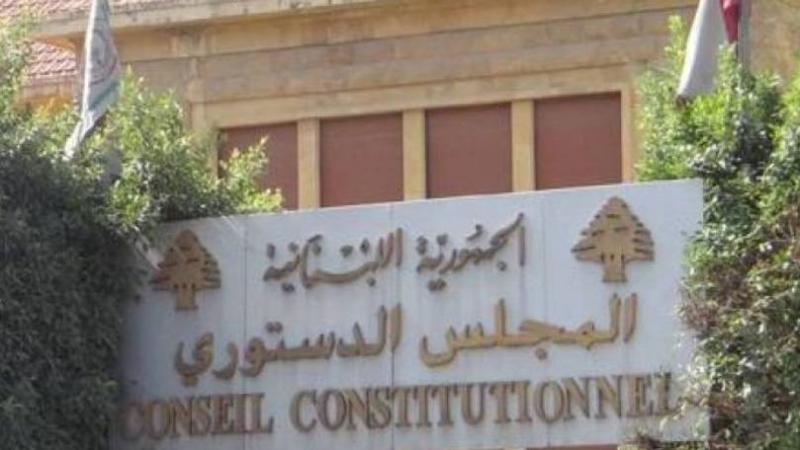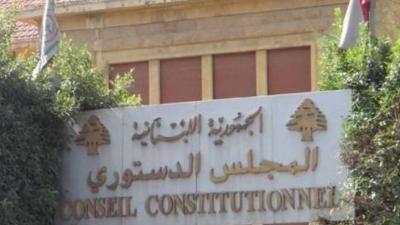At the beginning of next week, the reports from the rapporteurs will gradually arrive at the Constitutional Council to start discussions and issue decisions on the 15 appeals presented to it, which challenge the election of 18 deputies. The importance of these appeals lies in the fact that their results will be announced amidst the presidential election, which has entered its constitutional timeframe, while the search for every parliamentary vote to add to the existing alignments is ongoing. The President of the Constitutional Council, Judge Tannous Mashlab, said: "In principle, the Council should begin discussing these reports as soon as they arrive, amidst extremely difficult technical and logistical conditions surrounding the work of the Council and its staff, who do not exceed the number of fingers on one hand." He reaffirms that "it is likely that the appeals will be issued in two batches, especially since some may be ready within a short period, while others may require more time for discussion among the Council members."
He reveals that "the Council members have agreed to issue final decisions within the month-long period stipulated by the Council’s internal regulations, although this is an urging period and not a deadline, and thus the decisions will be announced before the end of October at the latest," according to the Council President. In this context, the former president of the Constitutional Council, Issam Suleiman, explained that "after the reports are submitted to the Council President, who in turn distributes them to the members, he holds an open session for thirty days to make decisions. This timeframe is also a period of urging and not a deadline because each decision made by the Constitutional Council requires the approval of at least seven members. If this number is not available to make the decision, it means there is no decision. Therefore, members can agree to take decisions, which may require more time than thirty days, since members may have observations on the reports submitted, which requires further study. Thus, this period may extend beyond thirty days; hence we call it a period of urging and not a deadline." He points out that "the difference between a period of urging and a deadline is that at the end of a deadline, there is no possibility of making a decision, while a period of urging is to encourage members to make a decision within this timeframe, and if they cannot make a decision within this timeframe, they will extend it."
Mashlab discloses that "the reports prepared by the rapporteurs include in some appeals the results of the recounting of many disputed ballots, indicating that some serious appeals necessitated this course of action, and many disputed ballots have been recounted, and the results of some of these appeals may be determined based on the new count." Conversely, a concerned legal source indicates that "some rapporteurs have not yet started counting the ballots, which are still piled up in their offices, and it is likely that the issuance of their reports will be delayed due to the counting process, which requires time and unavailable staff." He also states that "the report from the Election Supervisory Authority may significantly affect the rapporteurs' reports, especially since the Authority monitored 592 violations committed by the media, and 25 criminal complaints involving bribery and obstruction of the electoral process, along with referrals to the Ministry of Interior and Municipalities to impose fines for violations regarding the submission of comprehensive financial statements: 16 lists that did not submit their comprehensive financial statements, and one list that submitted them late, 356 candidates that did not submit their comprehensive financial statements, and 22 candidates that submitted their comprehensive financial statements late."
According to political sources, three main appeals could change the scene of the Parliament:
- The appeal submitted in Tripoli - Miniyeh - Dinniyeh by Faisal Karam who received 6,494 preferential votes against candidates on the change forces' lists, namely Ihab Matter (Sunni - 6,518 votes), Rami Fanj (Sunni - 5,009 votes), and Firas Al-Suloom (Alawite - 370 votes).
- The appeal submitted in Akkar by the candidate for the Alawite seat Haidar Zahreddine Isa, who received 3,948 preferential votes against Deputy Ahmed Rustum (324 preferential votes).
- The appeal submitted in Jezzine by former Deputy Ibrahim Azar against the list supported by the Shiite duo (7,894 votes) against Said Al-Asmar (1,102) on the "Forces" list and Charbel Masad (984) on the Osama Saad list and Abdul Rahman Al-Bizri.




